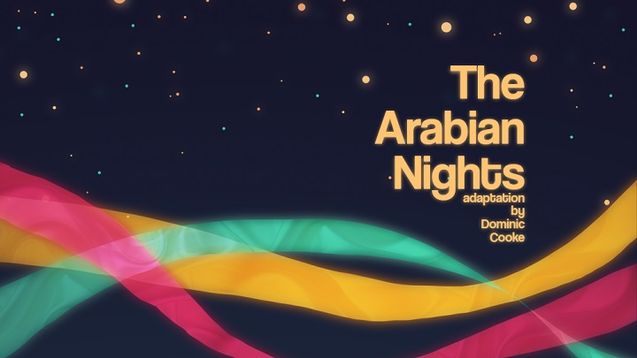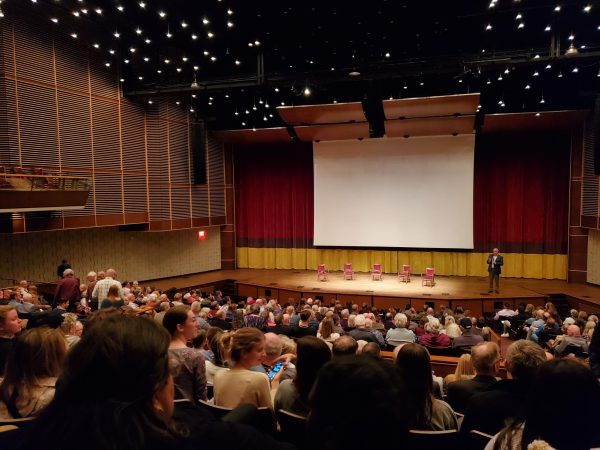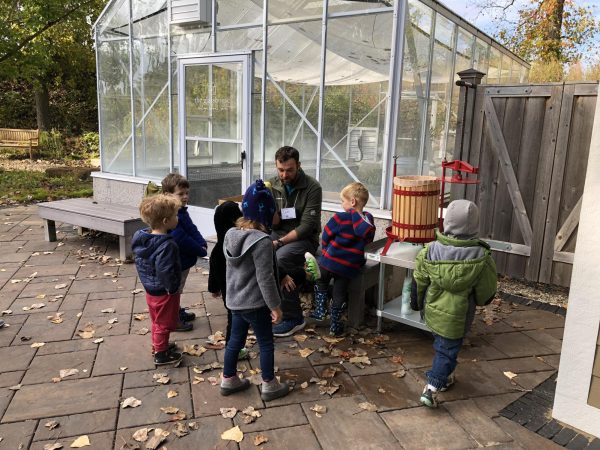Alumna composes original music for ‘The Arabian Nights’
This fall, Calvin theatre professor and director Debra Freeberg enlisted alumna Tricia Bayfield to create original music for “The Arabian Nights” (opening Nov. 2 in the Gezon Auditorium) and soundscape the play’s fantasy world. As a student, Tricia Bayfield contributed to the Calvin Theatre Company (CTC) in playwriting classes, the costume shop and even sometimes onstage. After graduating, she now acts in a new role: composer.
Drawing on Past Experiences
“The Arabian Nights” is Bayfield’s third time composing for the CTC, after writing vocal and transitional music for two shows in 2016. For “You Make a Difference,” she collaborated with Freeberg to create an original musical aimed at middle-school audiences. (The show eventually traveled to New Orleans last November to open the International Bully Prevention Association Conference.) For “Love’s Labour’s Lost,” Bayfield composed new music for scene transitions and for the song “The Owl and the Cuckoo,” recontextualizing the Shakespearean text in a new, Alaskan setting.
Informed by these previous experiences, Bayfield carefully watched the balance between music and action as she prepared for her work with “The Arabian Nights.”
“When you’re writing for theatre (especially when it’s not musical theatre), you want the music to be as far in the back as possible,” Bayfield said. “You don’t want to take away from the action on the stage.”
Wrestling with Cultural Appropriation
Producing a show titled “The Arabian Nights” carries an inherent temptation to appropriate Arab, Indian, and East Asian cultures to create an “exotic” storyline. Throughout the months of preparation, Bayfield and the rest of the creative team wrestled with questions of cultural appropriation. As explained at a scene and talkback event during UnLearn Week, they decided to set the show in a fantastical environment to avoid cultural stereotyping and restrictive referencing.
“All of us have been working together as the production crew – costumes, set design, and everything – to create a fantasy world inspired by these cultures,” said Bayfield. “I’m approaching the music is from that same fairytale storytelling perspective… I think we’ve found a good medium between inspiration and appropriation.”
As a composer, Bayfield therefore shied away from creating a definitively “Indian” or “Arab” soundscape, though she did listen to instruments and drones from many Eastern cultures to honor the stories’ details. One story directly references the kamanja, a long-necked Indian stringed instrument somewhat like the Western cello, but without that instrument’s resonant chamber. Bayfield therefore listened to recordings of the Indian stringed instrument’s “very rich and earthy violin sound” and incorporated its sound in her creations.
Bayfield also found inspiration in video game music, comparing its purpose to her own goals as a theatre composer.
“The entire point of background music in games is to enhance, not to take over,” she said. “It’s to immerse you in the world, instead of take you out.”
Creating in Context
As a composer, Bayfield views her role as a “flavor enhancer,” detailing the world of “The Arabian Nights” through incidental and vocal music. After meeting with Freeberg to discuss the director’s vision for the music, Bayfield began attending rehearsals and planning potential pieces.
The show’s sole vocal piece is much “more informal” than her previous show tunes, . In one scene, porter improvises the tune in-story while eavesdropping on music coming from a house.
Other musical moments require much more precise concentration and cooperation. At every full run rehearsal of “Arabian Nights,” Bayfield sat in the audience with her phone and her stopwatch, ready to scribble down transition times. The show’s dances, on the other hand, required input from choreographer, director, composer and their eventual performers.
Bayfield cited these moments as some of the most enjoyable to score, mentioning the professional choreography performed by actor Sophia Medawar as a favorite.
“You’re collaborating with another person in order to create something beautiful,” she said about the creative unity of music, dance and storytelling.
The dances allow the actors to embody their characters, and on another corner of the stage, Bayfield herself will join in the action. Though half of the show’s music will be pre-recorded, Bayfield will perform the other half in an onstage station equipped with ringing bowls, drums and other instruments. After joining the actors throughout their rehearsal process, she will improvise new sounds alongside the pre-recorded music, following the actors’ movements every night of the show.
“It’s going to be very dynamic in that way,” she said. “I like having the freedom to be organic.”
Collaborating with Other Artists
As a former CTC member, Bayfield appreciated the opportunity to join the community once again. She expressed a special admiration for the show’s younger cast members, noting their dedication to the show even while handling the stresses of academic life.
“When you have a cast and a production crew that has such strong dynamics with one another…. when you’re able to come together and trust each other creatively…. it’s amazing what you can create,” she said.
“The Arabian Nights” will run Nov. 3 – 4, 9 -11 at the Gezon Auditorium.








